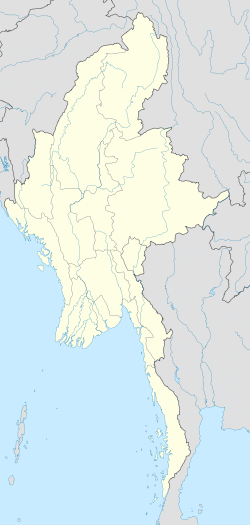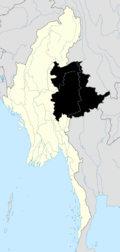Pangkham
Pangkham
Pang Kham • ဝဵင်းပၢင်သၢင်း • 邦康 Panghsang | |
|---|---|
| Coordinates: 22°10′N 99°11′E / 22.167°N 99.183°E | |
| Country | |
| Division | Wa State (de facto) Shan State (de jure) |
| Self-Administered Division (de jure) | Wa Self-Administered Division (de jure) |
| Special District (de facto) District (de jure) | Bangkum Special District (de facto) Matman District (de jure) |
| Population (2002) | |
• Total | 15,000 |
| • Ethnicities | Wa Shan Han Chinese |
| Time zone | UTC+6.30 (MMT) |
Pangkham (Burmese: ပန်ခမ်းမြို့; MLCTS: pan kham: mrui.; Chinese: 邦康; pinyin: Bāngkāng; Parauk: Pang Kham), known before 1999 as Panghsang (Parauk: Pang Sang, Chinese: 邦桑; pinyin: Bāngsāng; Wade–Giles: Pang1-sang1), is a border town in Myanmar's far eastern Shan State. It is situated at a bend on the Hka River near the border with Yunnan Province, China, opposite of the town of Menglian. Pangkham is the main town of Pangsang Township of Matman District of Shan State.[1]
It has hotels, shops, a supermarket, karaoke bars, a bowling alley, and a 24-hour casino.[2] There is a thriving night life centered on the casino. Food in Pangkham is mostly imported from China. The cars, mainly Land Rovers, Land Cruisers and foreign pick-ups, have been smuggled in from Thailand.[3]
History
[edit]Pangkham is the de facto capital of Wa State, officially designated the Wa Self-Administered Division, while Hopang is its capital assigned by Myanmar government. It is controlled by the United Wa State Army (UWSA), the military wing of the United Wa State Party (UWSP) formed after the collapse of the Communist Party of Burma (CPB) in 1989.[3][4]
In 1990s the Wa Women's Association established an orphanage in Pangkham for children's whose parents were killed in fighting between United Wa State Army and Shan forces.[5]
On 17 April 2009, the 20th anniversary of the coup against the CPB was celebrated in Pangkham, attended by representatives from the military government, Kokang, Kachin Independence Organisation (KIO), Shan State Army - North, and former members of the CPB.[6]
The next day, on 18 April 2009, a fire destroyed the largest petrol station and over 10,000 tons of teak in a warehouse in Pangkham, both belonging to one of the Wa leaders Wei Hsueh-kang.[7]
The road from Panghkam to Metman is 48 miles long.[8]
References
[edit]- ^ "Shan Herald Agency for News (S.H.A.N)". English.panglong.org. 22 January 2016. Archived from the original on 24 September 2015. Retrieved 5 February 2016.
- ^ Andrew Marshall, Anthony Davis (16 December 2002). "Soldiers of Fortune". TIME Asia. Archived from the original on 3 February 2003. Retrieved 21 February 2009.
- ^ a b Tor Norling. "Haven or Hell". The Irrawaddy, 11 July 2008. Archived from the original on 6 October 2010. Retrieved 21 February 2009.
- ^ "Panghsang tightening security". Shan Herald Agency for News (S.H.A.N.). 4 June 2005. Archived from the original on 11 February 2009. Retrieved 21 February 2009.
- ^ Ong, Andrew; Steinmüller, Hans (2021). "Communities of care: Public donations, development assistance, and independent philanthropy in the Wa State of Myanmar". Critique of Anthropology. 41 (1): 65–87. doi:10.1177/0308275X20974099. ISSN 0308-275X.
- ^ Wai Moe. "UWSA Leader Calls for 'Solid, United' Wa State". The Irrawaddy, 17 April 2009. Archived from the original on 27 April 2009. Retrieved 19 April 2009.
- ^ "Fire in Panghsang". Shan Herald Agency for News (S.H.A.N.). 19 April 2009. Retrieved 19 April 2009.
- ^ [1] [dead link]
External links
[edit]- Satellite map GeoNames
- Panghsang area mapShan Herald Agency for News (S.H.A.N.)
- Myanmar's Wa: Likely Losers in the Opium War Pierre-Arnaud Chouvy, Asia Times, 24 January 2004
- Photo: Panghsang - bridge to the hidden city Something about Myanmar, 28 February 2006
- Photo: UWSA on parade at Panghsang The Irrawaddy, 4 May 2009



